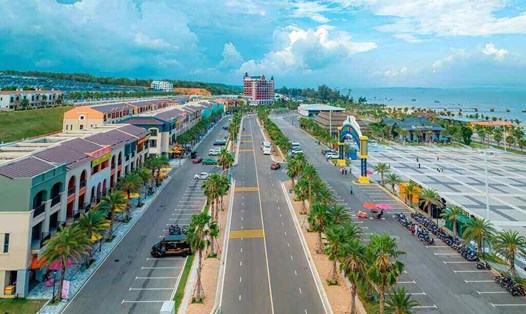In the fourth quarter 2024 market report of research unit DKRA, it was assessed that the resort real estate segment has almost lost liquidity nationwide.
The total primary supply in the month reached more than 10,000 units, but only 119 units were sold, equivalent to 1.2%. Most of the transactions were condotel products, while only a few villas and resort townhouses were sold.
Data from the Vietnam Association of Realtors (VARS) also shows that in the first 9 months of the year, sales volume in this segment was only 21% of the same period in 2022, mainly in the secondary market due to many options and reasonable prices.
Transactions hit rock bottom, but primary prices remain high. According to DKRA, the lowest price of a resort villa is around 5.2-14.6 billion VND per unit, the highest is 155 billion VND in the South and 134 billion VND in the Central region.
For condotels, the primary price is 36.6-62 million VND per square meter. In Da Nang, the highest price per square meter of condotel is 148 million VND, while in Quang Nam it is up to 156 million VND.
In the difficult context, investors still have to apply many preferential policies such as commitments, profit sharing, revenue sharing, interest rate support, principal grace period... but the effectiveness is not high. In the secondary market, investors facing financial pressure continue to reduce prices, "cut losses" to get rid of goods.
According to DKRA experts, market confidence in resort real estate remains very low, prolonging challenges in liquidity and price increase potential.
Although the tourism industry is gradually improving, many projects are not on schedule or even abandoned due to lack of capital, causing the "frozen" situation in this segment to be expected to last.
Experts say that legal problems have prevented many projects from being opened for sale, while high-value inventories have made liquidity difficult. At the same time, investors’ confidence has not yet recovered, which is also the main reason why the market is still in a difficult situation.
According to the Vietnam Association of Realtors (VARS), after a period of explosive development with a growth rate of up to 50% per year, from 2018 to present, the resort real estate market has continuously fluctuated due to both objective and subjective reasons.
The first is the impact of the COVID-19 pandemic. Although the story of the pandemic has ended for about 3 years, its impact on the economy in general and the real estate market in particular is undeniable. Especially in the resort real estate segment, all rental exploitation activities are almost frozen. Even when the pandemic is under control, this segment still cannot start up.
Meanwhile, the opening to international tourists is also limited. This affects the revenue of the tourism and resort real estate segment. Making this segment completely lose its attractiveness to customers/investors.
The next reason is the concern about legal transparency. When the market is hot, the story about profit expectations makes all the attention of customers and investors focused on it and temporarily put the legal factor aside.
However, when the market slows down and customers/investors start to tighten up, profit expectations are no longer enough to allay concerns about legal security.
Finally, the main reason is considered to be the "failure" of some investors with large-scale projects, along with attractive profit commitments, but all of them were not realized. From there, it caused customers and people to be confused, lose confidence and gradually become indifferent.











